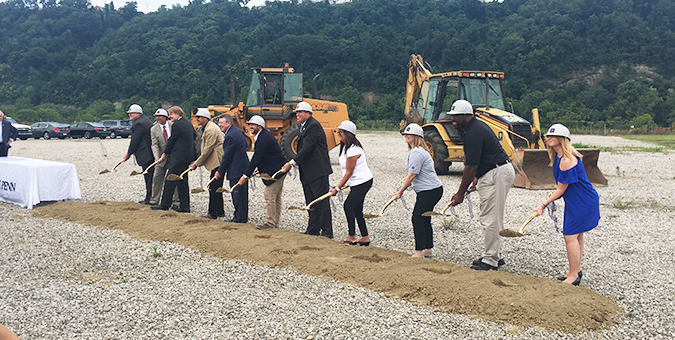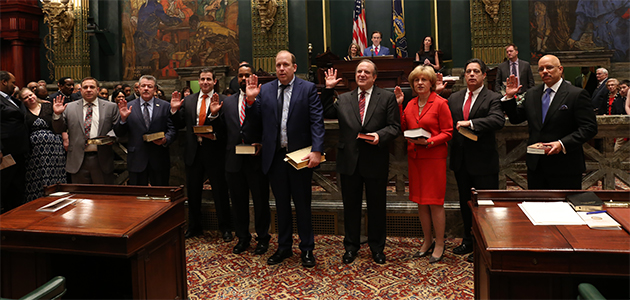September 21, 2017
 McKeesport – Sept. 21, 2017 – State Sen. Jim Brewster has scheduled his Senior Wellness and Safety Expo for Thursday, Sept. 28 from 10:30 a.m. to 1 p.m. at McKeesport Palisades, 100 Fifth Avenue in McKeesport.
McKeesport – Sept. 21, 2017 – State Sen. Jim Brewster has scheduled his Senior Wellness and Safety Expo for Thursday, Sept. 28 from 10:30 a.m. to 1 p.m. at McKeesport Palisades, 100 Fifth Avenue in McKeesport.
“The senior expo is an excellent opportunity for seniors from my district to access services and receive assistance,” Brewster said. “We have had great success in offering help for seniors.”
Brewster said that free flu shots and health screenings will be available. The Veterans’ Outreach Mobile Unit will also be on-site to aid veterans and their families.
“I look forward to hosting the senior expo and welcoming all who join us on September 28 at the Palisades in McKeesport,” Brewster said.
-30-
July 27, 2017
McKeesport – July 27, 2017 – At today’s groundbreaking for PurePenn, one of Pennsylvania’s first medical cannabis facilities, state Sen. Jim Brewster (D-Allegheny/Westmoreland) offered words of thanks and encouragement to the company for investing in McKeesport and bolstering the economy of the region.
The 21,000 square-foot facility is in the Industrial Center in McKeesport. A job fair was held immediately after the groundbreaking.
“The new PurePenn investment in McKeesport will boost the economy of the Mon Valley and all Southwestern Pennsylvania. Not only will the facility produce a product that will help individuals suffering from debilitating pain and difficult health issues, it will create jobs, build the business community and generate momentum for continued redevelopment of the region.
“The area will benefit from the PurePenn facility. This new business, combined with the recent decision to build the Mon-Fayette Expressway, will ignite even more economic activity. I congratulate PurePenn for deciding to join the business fabric on the region and make this area an even better place to live.”
###

July 9, 2017
Harrisburg – July 9, 2017 – State Sen. Jim Brewster (D-Allegheny/Westmoreland) said today that the legislation he offered to change the composition of the Municipal Police Officers’ Education and Training Commission is long overdue and is a common-sense change that will improve the operation of the commission.
The measure, Senate Bill 403, passed the Senate unanimously.
The bill removes the membership of a special agent-in-charge from the Federal Bureau of Investigation (FBI) with an appointee from the Pennsylvania Lodge Fraternal Order of Police (FOP). The FBI seat on the commission has been vacant since 2007.
“The FBI seat on the commission has been vacant for many years,” Brewster said. “The Department of Justice advised against making an appointment because they were concerned about a supervisory role as it relates to local police.”
Brewster served for many years as mayor of McKeesport. He was heavily involved in police training and said an additional FOP member will provide additional expertise and insight.
The legislation now awaits action in the state House of Representatives.
-30-
July 7, 2017
Harrisburg – July 7, 2017 – State Sen. Jim Brewster (D-Allegheny/Westmoreland) said today that he will again have outreach office hours at various locations throughout the region.
“We have had great success with our outreach offices in various parts of the district in the past, and I hope to continue making state services more accessible for the constituents throughout my district,” Brewster said.
Brewster has permanent district offices in Monroeville, McKeesport and the Alle-Kiski Valley as well as satellite office hours in Allegheny Township, Forward Township, Turtle Creek, and Vandergrift.
The senator said that he and his staff will be on-hand to help with various state-related issues while also assisting them with completing applications for pharmaceutical assistance, senior bus passes, and state Property Tax and Rent Rebate forms.
The dates and times for Senator Brewster’s first of multiple phases of district outreach offices are in the municipal buildings of the following communities:
- North Versailles Township: 9 a.m. – noon- July 10, August 14, September 11, October 16, November 13 and December 4
- Borough of Pitcairn: 1 p.m.- 4 p.m.- July 18, August 22, September 19, October 24, November 21 and December 12
- Borough of Plum: 1 p.m.- 4 p.m. – July 24, August 28, September 25, October 30, November 27 and December 18
- Borough of Trafford: 9 a.m.-noon- July 24, August 28, September 25, October 30, November 27 and December 18
- Borough of Turtle Creek: 9 a.m.-noon- July 17, August 21, September 18, October 23, November 20 and December 11
- Borough of Versailles: 9 a.m.- noon- July 25, August 29, September 26, October 31, November 28 and December 19
- Borough of Wall: 9 a.m.-noon- July 11, August 15, September 12, October 17, November 14 and December 5
- Borough of White Oak: 1 p.m.-4 p.m. – July 25, August 29, September 26, October 31, November 28 and December 19
- Borough of Wilmerding: 1 p.m.- 4 p.m. – July 11, August 15, September 12, October 17, November 14 and December 5
Residents can call or visit one of the senator’s district offices for assistance. Contact information and help is also available online at www.senatorbrewster.com.
-30-
June 26, 2017
Brewster Issues Statement of Support
Harrisburg – June 26, 2017 – The effort to build the final 14-mile phase of the Mon-Fayette Expressway received a significant boost today when the Southwestern Pennsylvania Commission (SPC) voted to move the project forward, an action that helps pave the way for the construction of the $2.2 billion roadway, Sen Jim Brewster (D-Allegheny/Westmoreland) said today.
Brewster and a bipartisan group of legislators and local advocates joined forces to support the completion of the route after it was unexpectedly tabled at a March meeting of the commission.
In a letter sent to the commission earlier this month, the group, featuring Brewster, Sen. Pat Stefano (R-Fayette) a host of senators and representatives from the region including Bill Kortz (D-Allegheny) and Marc Gergely (D-Allegheny) reiterated firm support for the project — highlighting its importance for the continued development of the communities in the Mon Valley, and its role in fostering job creation in the region.
Brewster’s comments follow:
“The Mon-Fayette Expressway will link people to jobs and shovel-ready projects to developers. The highway will spur the redevelopment of industrial sites and create new business opportunities not only for communities directly impacted, but also for others throughout the region. There are more than 1,000 acres of developable property in the region ready to be put into productive use. This project delivers on creating access to markets, and it is critical to job creation and development. I am pleased that the SPC took action today.”
-30-
June 21, 2017
Harrisburg – June 21, 2017 – The 2nd Annual “Going for the Goal Sprint Triathlon” will get underway on Sunday, June 25 at 8:00 a.m. at McKeesport High School in McKeesport, Sen. Jim Brewster (D-Allegheny/Westmoreland) said today.
“This event attracts exceptional athletes from all over the country to compete and experience the beauty of the Mon Valley,” Brewster said. “While an athletic competition, the triathlon has also become an exciting way to showcase the many resources and opportunities in the McKeesport area.”
The triathlon consists of three events: 300-yard swim in the high school swimming pool, 8.5-mile bike ride through the Great Allegheny Passage trail and a 5K run through beautiful Renziehausen Park.
If you are interested in signing up, individually or as a team, simply go to www.parunners.com to register. Same day registrations will also be accepted. Any questions contact Event Coordinator Alison Piccolino at 412-398-1256.
The triathlon will benefit the McKeesport Trail Commission and programs operated by the McKeesport-White Oak Kiwanis.
Brewster has partnered with the McKeesport Hospital Foundation, McKeesport Area School District, City of McKeesport, the McKeesport Trail Commission and McKeesport-White Oak Kiwanis to put the program together.
“There has been a lot of teamwork involved by all partners and supporters of the triathlon,” Brewster said. “We have worked together to create a health and wellness event that people of all ages can enjoy.”
This year’s “Going for the Goal Sprint Triathlon” will also be the kick-off for “Live Well City of McKeesport”.
This initiative made possible by the City of McKeesport and McKeesport Area School District’s collaboration with the Allegheny County Health Department’s Live Well Allegheny campaign.
This initiative focuses on bringing awareness to building healthy lifestyles for all residents in the city. County Executive Rich Fitzgerald will be joining the event this year to congratulate the community on focusing on an important county campaign while also cheering on the triathlon participants.
“We are all looking forward to a competition that harnesses the energy of the region, creates good will for local residents and highlights the growth of the area,” Brewster said.
The triathlon has significant local support from businesses and community groups.
-30-
June 20, 2017
Harrisburg – June 20, 2017 – State Sen. Jim Brewster (D-Allegheny/Westmoreland) issued the following statement after the Pennsylvania Department of Health today awarded a medical marijuana grower and processor permit in the City of McKeesport to PurePenn LLC. The site is located on five-acres of property on Industry Road in the city.
Brewster’s comments follow:
“The approval of the permit for a medical marijuana grower in McKeesport is excellent news. Medical marijuana will help those who suffer from debilitating pain and serious medical conditions. Plus, the new permit will bring jobs and economic development to the region.
“The new industry in the city will attract other businesses who will want to locate near the facility and create spin-off businesses that will generate additional work for local residents. The entire economy of the region will be improved. This is another large step in the rebuilding of the city and region. It is certainly good news for the city and the area as a whole.”
-30-
June 19, 2017
Harrisburg – June 19, 2017 – The “Pennsylvania Report” featuring state Sen. Jim Brewster is focused on the state’s opioid and heroin crisis and Brewster’s legislation to effectively deal with the epidemic.
“We need to find new ways to address the opioid crisis” Brewster said. “My approach is comprehensive in scope and depth and will tackle the problem on multiple levels.”
The senator’s legislation (Senate Bills 710, 711 and 712) includes mandatory treatment for addicts, a limitation on the total milligrams of opioids that may be prescribed per patient and new, tough sentences for drug dealers who possess illegal weapons.
Jason Snyder, special assistant to the Pennsylvania secretary of the Department of Human Services, was a guest on the program and offered his expertise about the opioid crisis and detailed how policymakers have responded with new laws and legislative initiatives. He also commented on the ways the epidemic can be dealt with in the future and how family members can seek help for a loved one who is addicted.
The “Pennsylvania Report” can be viewed by going to Brewster’s website or it will be available on Greensburg, Penn Hills, Pittsburgh, Pittsburgh Suburban and Tarentum cable outlets Sunday evenings on channel 190 at 8 p.m. beginning on June 25.
-30-
May 24, 2017
Harrisburg – May 24, 2017 – State Sens. Jim Brewster (D-Allegheny/Westmoreland) and Vincent J. Hughes (D-Philadelphia/Montgomery) reacted to today’s release of the Legislative Budget and Finance Committee report, which examined the financial impact of charter schools in Pennsylvania.
Brewster and Hughes have been long-time advocates of changing the state’s charter school law. Both senators have introduced legislation that includes a wide range of charter reforms.
“The Legislative Budget and Finance Committee study gives the General Assembly an excellent analysis of how charter schools operate vis-à-vis local school districts and where improvements can be made,” Brewster said. “The report includes a long list of recommendations that, if adopted, will aid public schools and provide charters with a reasonable path forward.”
Hughes, who serves as Democratic chair of the Senate Appropriations Committee, said that the charter law needs to be examined and reworked with reasonable and responsible changes that improve accountability and better serve students and taxpayers.
“Our charter law needs to be changed significantly with reforms that make sense,” Hughes said. “Charter schools play a role in our education system and have a place, but they cannot be positioned in such a way that they financially put our traditional public schools in a bind.
“The report from the LBFC reinforces the idea that the current system needs to be reformed.”
Brewster, who is vice chair of the committee, has offered a comprehensive charter reform measure (Senate Bill 670), which would realign and redefine how local school districts, charter schools, students and taxpayers interact. Hughes’ legislation, Senate Bill 198, would provide local school boards with the tools to better oversee charter schools in their school districts.
The LBFC report included several recommendations, including the following:
- Allowing fiscal considerations to be considered by school districts, the Pennsylvania Department of Education (PDE), Charter Appeal Board and the courts for new and expanded public charter applications;
- Permitting school districts to negotiate charter per pupil payment rates and methods;
- Eliminating mandates for transportation that are inconsistent with services offered for district-operated schools;
- Requiring parents who place students in charters to first register with school district and then notify the district of changes in status;
- Modifying the PDE funding intercept process to allow school districts to verify that it is responsible for payment prior to funding being intercepted by the department;
- Eliminating public school districts’ responsibility for charter school compliance with compulsory attendance requirements;
- Requiring greater transparency and fiscal accountability addressing such items as shell ownership, leasing, state payments, and conflict of interest policies; allowing audits of funds transferred to associated entities and for-profits; prohibiting the guaranteeing of loans where there is no direct school involvement; and requiring charter to timely submit financial records for the district to review; and
- Requiring all “brick and mortar” charter school students from multiple districts to obtain regional charters.
Several of the accountability and transparency provisions noted in the report are already pieces of Brewster’s and Hughes’ bills.
Brewster said there are significant political and financial issues to deal with when the legislature is moving forward with charter reform but he said he thinks common ground can be found and a better charter law produced.
“The law needs to be changed to include financial reforms, accountability measures and alterations to how the charter school appeal board operates,” Brewster said. “The recommendations made by the LBFC, combined with provisions in my legislation, Senator Hughes’ bill and others would go a long way toward improving how charters interact with local school districts.”
“There are many ideas to incorporate and plenty of work to do to achieve a better charter law,” Hughes said. “Our local school districts and charter schools both need to be treated fairly. We can strike that balance.”
Brewster said that he wanted to thank the members of the LBFC and its staff for its excellent work in preparing the report and the recommendations.
Editor’s Note: A copy of the LBFC report is available online: http://lbfc.legis.state.pa.us/Resources/Documents/Reports/584.pdf
-30-
May 5, 2017
Harrisburg – May 5, 2017 – State Sen. Jim Brewster’s seventh annual Student Government Day Seminar, held yesterday at Penn State Greater Allegheny in McKeesport, included 11 local schools, 180 students, political leaders from Allegheny and Westmoreland counties and an array of officials from Harrisburg, Brewster (D-Allegheny/Westmoreland) said today.
“This was an incredible event for students,” Brewster said. “It gives students an opportunity to learn more about how an idea is transformed into legislation and passed into law.”
 Students from South Allegheny, Auberle, Pittsburgh Job Corps, Gateway, McKeesport, East Allegheny, Kiski, Baldwin, West Mifflin, Plum and Clairton gained an understanding of the legislative process by debating a measure that calls for mandatory treatment for drug addiction.
Students from South Allegheny, Auberle, Pittsburgh Job Corps, Gateway, McKeesport, East Allegheny, Kiski, Baldwin, West Mifflin, Plum and Clairton gained an understanding of the legislative process by debating a measure that calls for mandatory treatment for drug addiction.
The students attended two panel discussions before the plenary session. The first panel provided insight into the fundamentals of legislating. The second explored ways political parties are formed and what motivates citizens to join the political process. Students were then organized into parties, where they debated the merits of the proposed legislation.
“Our students gain so much from participating in the sessions. They gained knowledge about the inter-workings of the General Assembly and how a bill becomes law, and were able to interact with legislators, staff, lobbyists and public officials who are experienced public servants and experts in making laws,” Brewster said. “I want to thank the students, teachers, administrators and all those who were involved in making this event such a success. “
Brewster said that he also wanted to extend his appreciation to the officials from Penn State Greater Allegheny for the use of their facility and the assistance offered to ensure that the day was tremendous learning experience for the students.
-30-
April 19, 2017
Mandatory Treatment, Strict Prescription Limits, Tough Sentences for Dealers with Illegal Guns Featured
Harrisburg – April 19, 2017 – A package of legislation requiring mandatory treatment for drug addicted offenders charged with minor offenses, strict opioid prescription limits, and new stiff penalties for those possessing large quantities of drugs and illegal guns will soon be introduced by state Sen. Jim Brewster (D-Allegheny/Westmoreland).
“We must address the causes, effects and repercussions of heroin addiction on multiple levels,” Brewster said. “The problem has reached epidemic proportions and a new approach that focuses on drug prevention, recovery and enforcement needs to be put into place.
“New laws are necessary to get those who are addicted and commit minor criminal acts into treatment and stop the flow of prescription opiates leading to heroin dependency. Plus, lawmakers need to really drill down on those who push drugs while possessing illegal guns.”
Under Brewster’s legislation, a person charged with a minor non-violent criminal offense (misdemeanor one and lower) who has been treated by first responders in emergency situations can be subject to mandatory commitment to a treatment facility if it is determined that he or she is addicted and believed to be a danger to himself or herself or others. The person charged, his or her attorney, or the district attorney will initiate the mandatory treatment procedure.
A hearing would be held within 10 days of arrest to ascertain whether the person can be involuntarily treated. The initial period of treatment would be 12 months. Out-patient treatment may be available if a panel of experts determines that treatment can be maintained. If the person successfully completes the treatment protocol the criminal charges may be dismissed.
“Short-term treatment regimens are not always successful in dealing with addiction,” Brewster said. “In some cases, the person finishes treatment returns to dependency – often committing a crime to pay for more heroin. It is important to break that cycle.
“This proposal gives those who commit relatively minor, non-violent crime due to their addiction the opportunity to treat their addiction and have the charges dismissed.”
The lawmaker said that mandatory treatment is only one part of the three-pronged approach. His legislative package also includes a strong prevention component. The plan would prohibit opioid prescriptions of more than 100 milligrams of morphine or the equivalent each day. The idea, he said, is to stop abuse of the most commonly prescribed opioids.
“Perhaps the most important act we can take is to prevent the abuse of opioids by restricting the availability of the drug,” Brewster said. “This legislation is in line with federal Centers for Disease Control (CDC) and state board of medicine guidelines.”
Brewster said that his measure also mirrors a law now in force in Maine that restricts opioid prescriptions. He said the CDC indicated that patients receiving prescriptions in higher levels than those specified in the guidelines are linked to patient harm and represent a disproportionate share of overdoses.
The final piece of his package is aimed directly at enforcement and drug dealers who illegally possess guns. Brewster’s bill would restore stricter sentences for armed drug dealers previously invalidated by the courts. He proposes stiffening penalties for those possessing both large quantities of drugs and illegal weapons. Sentences are enhanced by one grade if the individual is convicted of dealing while illegally possessing a weapon.
“The heroin epidemic is often fueled by well-armed drug dealers who prey on those who are addicted,” Brewster said. “If this measure passes, drug dealers who prowl about loaded with drugs and illegal guns will be dealt with harshly.
“Taking drug dealers off the streets for longer periods of time will help stanch the flow of drugs.”
The McKeesport lawmaker, who formerly served as mayor, said that he realizes the approach outlined would be expensive but that ways of defraying costs may be available.
“There are several ways officials can deal with the cost of the approach I’ve detailed,” Brewster said. “Many of those who are charged with minor offenses involving drug addiction end up incarcerated. If they are treated, remain clean and there is no recidivism, then taxpayer-paid corrections costs are reduced.
“I also believe that we can also shift some of the cost of treatment to the federal government through Medicaid-eligible individuals who are charged. Additionally, there are funds from drug seizures can be redirected to help pay for drug treatment.”
Brewster said that by bringing stakeholders in the treatment community – non-profit treatment facilities, hospitals, for-profit treatment centers – together an assessment can be made concerning the resources necessary to put his comprehensive approach into effect.
“Better coordination and collaboration is essential for all the aspects of this plan to function effectively,” Brewster said.
He said that he is anxious to work with leaders in the effort to eradicate opioid abuse, such as state Sen. Gene Yaw (R-Lycoming) and Gov. Tom Wolf, who have been dedicated to developing policies to address the problem.
“I applaud the work of Senator Yaw and Governor Wolf, and all the members of the General Assembly, for the effort thus far,” Brewster said. “Getting to the root of problem, preventing opioid abuse, providing treatment, and enforcing new laws aimed at drug dealers with guns builds on the foundation.”
-30-
March 31, 2017
Costa, Brewster insist that Turnpike dollars are obligated to improve regional access
Harrisburg – March 31, 2017 – State Senate Democratic Leader Jay Costa (D-Allegheny) and Sen. Jim Brewster (D-Allegheny/Westmoreland) said today that the legislative commitment concerning the Mon-Fayette Expressway is clear and that improving access to the region via a revitalized and comprehensive transportation network is an obligation that must be fulfilled.
The lawmakers released the following statements in response to the Southwestern Pennsylvania Commission’s (SPC) vote earlier this week to delay funding of the Mon-Fayette Expressway. This was closely followed by an announcement by the Pennsylvania Turnpike Commission that it was halting work on the roadway. The combined actions of the two agencies put further economic development opportunities associated with the project in jeopardy.
The lawmakers are calling for a meeting to be convened with members of the SPC, plus officials from the Turnpike, PennDOT, and regional leaders to discuss the status of the project.
The vote suspended funding for the final 14-mile piece of a proposed 74-mile highway running from West Virginia to Monroeville. The estimated total cost of the last section of the roadway, which connects PA Route 51 in Jefferson to Monroeville, is $2.1 billion.
The Mon-Fayette Expressway project was authorized in statute and identified as a legislative priority. The funds, if not spent on the project, may be used to pay for other legislatively-mandated projects, some of which are not located in the Mon Valley or eastern suburbs.
Costa’s statement follows:
“The decision by the SPC and the Turnpike puts further development of the project in jeopardy. These actions by these two agencies should not be viewed as a license for officials from other areas to try and leverage the funding for projects outside of the region.
“The funding set aside for the project is intended to pay for the improvement of the road network serving economic development sites in the Mon Valley and eastern suburbs. As a result of the actions of this past week, we need a more detailed examination and explanation of how the Turnpike is going to ensure that the legislative mandate to build the road network is going to be accomplished.
“This is an authorized project that was established by statute to aid the region. Those funds set aside for this project should be used to make significant improvements and upgrades to the road system of the region, not be used to help fund projects in Philadelphia or elsewhere. The goal of the project was to improve access and create jobs. We cannot lose sight of the intent of the project.”
Brewster’s statement follows:
“It is imperative that officials from the Turnpike and PennDOT recognize that the enhancement of the road network in the Mon Valley and eastern suburbs is critical. Building a first-rate road system for the region through the auspices of the Turnpike has been a priority, is specified in law, and the legislative mandate cannot be ignored.
“There is a compelling need for a quality transportation system that complements the region. Workers, businesses and residents of the area must be connected to jobs, markets and communities so the entire region can be revitalized and quality of life improved. That need has not been altered by the delay in funding the Mon-Fayette.
“The people in the region have waited a long time for a transportation link that opens up long-dormant economic sites so that the whole area can enjoy economic resurgence. The funds were intended to create access to the region and should not be used to fund projects that do little or nothing to help revitalize the Mon Valley and east suburban communities.”
-30-
March 29, 2017
Harrisburg – March 29, 2017 – More than $675,000 in grant funding has been approved for seven sewer rehabilitation projects in the Allegheny Valley, Mon Valley, South Hills and east suburbs, according to state Sen. Jim Brewster (D-Allegheny/Westmoreland).
The funding was approved for sewer projects in Clairton, Monroeville, North Versailles, West Elizabeth, New Kensington, Pleasant Hills and Versailles. The funds were approved through the Commonwealth Financing Authority’s Pennsylvania Small Water and Sewer program.
“The grant funding will help deliver sewer upgrades for communities stretching from the Allegheny Valley, through the east suburbs, in the Mon Valley and into South Hills communities,” Brewster said. “Accessing state grant funds defrays local costs and helps communities pay for critical upgrades.
“I am pleased that our work to generate state funding for these projects was successful.”
Brewster said that the projects set to receive a portion of the Small Water and Sewer Funds include:
- Clairton Municipal Authority: Grant funding of $85,750 to pay for the installation of corrugated pipe to address storm water infiltration along Beech Alley and Waddell Avenue;
- Monroeville Municipal Authority: $94,550 in grant funds to rehabilitate 5,500 linear feet of sewer line to repair structural defects and eliminate ground water infiltration;
- North Versailles Township Sanitary Authority: $29,115 in state grants to replace 523 linear feet of sewer line and four manholes in the Hoffman Road rear line. This will stop storm water infiltration into the sewer system;
- West Elizabeth Sanitary Authority: Grant funding of $19,800 to install a low pressure sanitary force main to serve residents on Fourth Street Extension. This project ensures sewage treatment for five homes that will be unable to connect to a new treatment facility;
- Municipal Authority of the City of New Kensington: $347,325 grant funding for sanitary and storm line separation as part of the Parkway Drive project. The project includes the installation of 1,350 of 15-inch storm line;
- Pleasant Hills Authority: $89,625 state grant funding to line the sewer interceptor in the Lewis Run and Lick Run area to reduce inflow and infiltration into the sewer system and untreated wastes into groundwater and surface water;
- Versailles Borough: Grant funding in the amount of $33,835 to repair structural defects within the sanitary sewer system, including the raising of 3 manholes and the installation of one manhole to improve access to the sewer system.
Brewster indicated that $22 million will be distributed across the state as a part of the Pennsylvania Small Water and Sewer Program in this funding round.
-30-
February 27, 2017
Harrisburg – February 27, 2017 – The relationship between school districts, charter schools, students and taxpayers would be fundamentally realigned and restructured if comprehensive charter school reform legislation soon to be introduced by state Sen. Jim Brewster (D-Allegheny/Westmoreland) was enacted, the lawmaker said today.
“The goal of my legislation is to realign and redefine how local school districts, charter schools, students and taxpayers interact,” Brewster said. “The legislation is heavy on accountability to the local taxpayers and school board; flexible enough for charters and cyber charters to function as they were designed; and full of sensible reforms that will result in qualitative and fiscal improvements over the long haul.”
Brewster said that he is proposing two separate legislative proposals that will, as a package, accomplish his goal of having charters and local school boards working in concert to promote educational opportunities.
“The evidence points to a system that has devolved into an unrecognizable unaccountable approach to education that is fueled by outside interests,” Brewster said. “My proposal organizes the disjointed pieces that are now strewn across the education spectrum into a pattern that will help children and ensure that taxpayer concerns are addressed.”
“Charters were intended to be an outlet for innovative education and function within the goals of the school district, not be an ad hoc group attached by a financial cord to local taxpayers,” Brewster said.
Brewster’s plan includes financial reforms such as the following:
- Requiring charter schools to post a surety bond to guarantee that the school can operate through the year;
- Forcing charter schools to gain the approval of the host school board for the financing of new charter school construction in excess of $1 million if the project is financed through a local industrial development group or taxpayer-backed development agency;
- Compelling charter schools to include a detailed financial impact statement as part of a charter school application;
- Prohibiting lease payments to charter school board members;
- Requiring charter schools to invoice for actual services provided to special education students;
- Allowing traditional public schools to place privately donated funds into special accounts and keep these funds segregated from charter school dollars;
- Returning any investment funds or interest accrued by charters not used to pay operating or necessary expenses back to the host school district;
- Waiving the requirement that charter school students be bussed by a school district if the host school district does not transport its own students;
- Prohibiting the use of taxpayer dollars in advertising about the school, its facilities or mission plus halting the use of taxpayer funds for membership in advocacy associations or lobbying.
“Redefining the relationship between charter schools, cyber charters and traditional schools involves more than simply changing how bills are paid and schools financed,” Brewster said. “We have to address issues on multiple levels to ensure that systemic reform takes hold.”
One of the major areas of focus in Brewster’s legislation relates to upgrading accountability to students and taxpayers. Brewster said his legislation includes the following:
- Requiring charter schools to gain approval from multiple school districts if students are drawn from outside the host district, as a part of the application process;
- Forcing charter schools to report quarterly and, in person, to the host school district, with copies of the report sent to all school districts from which students are drawn;
- Increasing the percentage of certified teachers from its current 75 percent to 90 percent, while grandfathering the current faculty to lessen disruptions;
- Imposing a moratorium on the approval of new cyber charter schools.
Brewster said that one of the major issues he confronted in developing his legislation was the complex role that the state Charter Appeal Board (CAB) plays in the relationship between charter schools and traditional public schools. He said the current structure is in dire need of reform.
“What I am proposing is an entirely new role for the appeal board and how it interacts with local school boards,” Brewster said. “The board has an authoritarian role in the charter approval process that, in many ways, makes local school boards subservient.
“An appeal board, situated in Harrisburg and not accountable to local taxpayers, should not be able to wipe away a decision by a local school board that disapproves a charter application.”
The reform proposal includes several provisions related to the CAB, including the following:
- Limiting the CAB to determining whether the local school board acted appropriately during the review of an application for a charter;
- Requiring that officials from the state Department of Education visit the site of a proposed charter school. The report will become part of the charter school’s application and become part of the record on appeal to the CAB;
- Mandating that the impact of the charter school on the fiscal health of the school district be considered as a part of the appeal.
Brewster said that the proposed changes in his legislation are significant, but the relationship between charters, cyber charters and traditional public schools has been strained and that a reset is warranted.
“Taxpayers, students of both charter and traditional schools, parents, teachers, administrators and state officials are tangled up in web of ineffective charter laws, outdated policies and destructive politics,” Brewster said. “My plan provides an opportunity to restructure and realign charter schools within the traditional school system.”
Brewster said that he expects to introduce the package of bills in the next couple weeks.
-30-
February 7, 2017
Plan calls for $2 billion in cuts, additional investment in education
Harrisburg – February 7, 2017 – State Sen. Jim Brewster (D-Allegheny/Westmoreland) released the following statement concerning Gov. Tom Wolf’s proposed budget for Fiscal Year 2017-18:
“The proposed $32.3 billion General Fund budget cuts more than $2 billion in expenses, calls for spending slightly more than 1 percent over last year and deals with a looming $3 billion deficit without a broad-based income tax hike.
“The governor has outlined a spending plan that cuts billions in expenses, increases spending slightly and leans heavily on agency efficiencies and consolidations of state agencies. Facing a $3 billion budget deficit if no actions were taken, the governor decided to go in a new direction. It is a new approach and reinvention of how we view government.
“The proposed budget makes investments in education, job creation and opioid treatment while maintaining social service programs to help our most vulnerable. As a blueprint and a starting point, the proposed plan touches all the bases and checks all the boxes.
“Job creation, health care, property tax relief and education are priorities. It will be critical that we identify how the proposed spending plan deals with these issues during the three weeks of upcoming budget hearings before the Senate Appropriations Committee.
“As a member of the committee, I will review this plan carefully to ensure that the needs of my district are addressed.”
-30-
February 1, 2017
Harrisburg – February 1, 2017 – State Senate Democrats said that Gov. Tom Wolf should call a special session of the General Assembly to ensure that legislation that results in significant property tax relief or total elimination is passed and signed into law this session.
At a news conference today at the state Capitol, Senate Democratic Leader Jay Costa (D-Allegheny) said taxpayers of Pennsylvania have waited too long for relief from escalating tax bills.
“We believe there should be a full, complete and transparent discussion of any and all tax relief or elimination proposals,” Costa said. “A special session provides the kind of platform that is needed for citizens and lawmakers to understand specifics about each proposal.”
Leading the call for the special session, state Sen. Lisa Boscola (D-Northampton) said, “Relief from property tax needs to be addressed without delay.”
In the letter to the governor, the Democrats stated, “Our taxpayers have waited far too long for action on this important issue. They want lawmakers to set aside partisan agendas and enact a significant property tax reform or elimination measure–NOW.”
Working families are struggling to pay mortgages and save for college for their children while seniors have to scrape resources together to make ends meet; property taxes add to their burden, the letter said.
Boscola, who has been a long-time advocate of property tax elimination and relief, said that “my goal is to pass legislation that will eliminate the property tax and replace it with a better system to fund public education. Our homeowners deserve it and our children need it.”
Another strong proponent of calling the special session is Senate Democratic Whip Sen. Anthony H. Williams (D-Philadelphia/Delaware).
“Addressing property tax relief or elimination needs to be a top priority, but is critical that we look at all the plans closely and find common ground,” Williams said. “A special session will force the General Assembly to focus on the issue, act assertively and come forward with a proposal that is balanced and equitable.
“Our property taxpayers have waited long enough.”
Senate Democratic Appropriations Chair Sen. Vincent J. Hughes (D-Philadelphia/Montgomery) endorsed the call for a special session.
“The issue of property taxes has been a top priority for Pennsylvanians, many of whom have seen significant tax increases over the past few years,” Hughes said. “This special session would serve as an opportunity to thoroughly examine how we can provide the sustainable property tax relief that Pennsylvanians want and deserve while ensuring that our school districts are still properly funded.”
Sen. John Blake (D-Lackawanna) said that a special session will allow lawmakers to fashion a plan that strikes a balance between property tax relief and reliable state support for public education.
“For many Pennsylvanians – particularly our seniors and lower income property owners – there is a very real school property tax crisis. I remain committed to a responsible solution that can significantly reduce and, if possible, eliminate the property tax burden on these lower income property owners,” Blake said. “I believe strongly that a special session on property tax reform can finally allow the legislature to strike the appropriate balance between property tax relief and the assurance of sufficient, predictable and reliable state financial support for public education.”
Sen. Jim Brewster (D-Allegheny/Westmoreland) said he hoped a special session will spur lawmakers to act.
“For too long our taxpayers have watched while the General Assembly has tried to deal with reducing property taxes,” Brewster said. “There are many plans now being drafted or considered and lawmakers need to come together on a plan that provided real relief or elimination. Taxpayers have waited too long.
“A special session is an excellent forum for all plans to be discussed, including the plan to totally eliminate property taxes.”
Sen. Sharif Street (D-Philadelphia) said that there are several approaches to address tax reform, but lawmakers need to be thoughtful about how tax elimination impacts schools.
“If we’re going to get serious about providing property tax relief or elimination, we must do it thoughtfully. We certainly can’t hastily approve an elimination plan at the expense of our public schools,” Street said. “There are several approaches to addressing property taxes, so a special session would provide us with a clearer path toward true relief.”
Sen. Judy Schwank (D-Berks), who has long been an advocate of property tax elimination, said school property tax is a complicated issue.
“One large source of revenue for school funding must be replaced with multiple other sources, and we must do this fairly and uniformly,” Schwank said. “Let’s use this special session to strike a balance between relieving the heavy burden property owners face, while also providing our schools with a reliable source of investment.”
Sen. Art Haywood (D-Philadelphia/Montgomery) said that property tax reform is a complex issue, but one that must be addressed.
“Property taxes remain an important issue to address. I still maintain that the appropriate solution will prove complex. We must dedicate time and effort to ensure the solution is successful,” Haywood said.
“The property tax is no longer sustainable as the sole source of funding for public education. It is high time for us to come together in the spirit of bipartisanship to develop and enact new and lasting solutions to the ongoing burden of rising property taxes on Pennsylvania homeowners,” Sen. Andy Dinniman (D-Chester) who serves as minority chair of the Senate Education Committee said. “This is a process that must involve both school districts and direct input from taxpayers and homeowners.”
The governor is empowered to call a special session of the General Assembly under the provisions of Article II, Section 4 and Article IV, Section 12 of the Pennsylvania Constitution.
-30-
February 1, 2017
HARRISBURG, February 1, 2017 – The Pennsylvania Fish and Boat Commission (PFBC) announced today that the 2017 adult trout stocking schedules are now available online and on the PFBC’s “FishBoatPA” mobile app.
Anglers can easily search the trout stocking schedules for locations and dates of interest. To view the list, simply go to www.fishandboat.com, click on the link “Fish” in the upper right corner, then select Trout Stocking Schedules. From there, select a county and enter start and end dates from the calendars at the top of the page. Then press “Go.”
For anglers with smartphones, an even easier way to view the schedules is through the FishBoatPA app, which is available for free from the Apple App and Google Play stores.
Included in this year’s stocking lists are the Keystone Select Stocked Trout Waters, a program where 14 waters across the state will be stocked with large 14” – 20” trout. Approximately 4,500 large trout will be distributed among the 14 waters at a rate of 175 to 225 per mile, which is comparable to the numbers of similarly sized fish in Pennsylvania’s best wild trout waters.
The program was launched last year with eight waters. This year six new waters are being added. Select here to see the list of waters.
January 27, 2017
Harrisburg – January 27, 2017 – Help in accessing the state’s Property Tax and Rent Rebate program for eligible seniors, widows and widowers aged 50 plus and people with disabilities 18 years of age or older is available in each of state Sen. Jim Brewster’s (D-Allegheny/Westmoreland) district offices, the lawmaker said.
“I would encourage constituents who believe they are qualified for property tax and rent relief to reach out to any of my offices and speak with my staff,” Brewster said. “This is an excellent program that provides real relief for high property tax or rent bills.”
The program, operated by the state Department of Revenue and supported by the Pennsylvania Lottery, has provided $6.1 billion in property tax and rent relief since 1971.
Brewster said that tax and rent relief for those eligible is based on income. The maximum property tax relief for those earning $8,000 a year or less is $650. Any qualifying senior with yearly income $35,000 or less may qualify. Renters with incomes below $15,000 qualify for assistance. Half of Social Security income is excluded.
“My staff is very experienced in helping seniors and others who qualify to receive benefits under this program,” Brewster said. “Anyone who is interested in getting help in preparing an application should call or visit my offices.”
Brewster’s local district offices are located in Monroeville, McKeesport and New Kensington. The Monroeville office is located at One Monroeville Center, 3824 Northern Pike, Suite 1015 and can be reached by phone at 412.380.2242. The McKeesport office is at 201 Lysle Boulevard and the phone number is 412.664.5200. In New Kensington, the office is at the New Kensington City Hall, 301 11th Street, Suite L, 724.334.1143.
-30-
January 23, 2017
Harrisburg – January 23, 2017 – State Sen. James Brewster (D-Allegheny/Westmoreland) said today his Democratic committee chairmanships and his membership on key committees will help push key issues that are important to the citizens of Allegheny and Westmoreland counties.
“I am very pleased to be appointed Democratic chair of the Law and Justice and Game and Fisheries committees,” Brewster said. “My other committee assignments also put me in position to be a strong advocate for issues impacting the citizens of Allegheny and Westmoreland counties.”
Brewster was also selected to be on the Appropriations, Banking and Insurance, Education, Local Government, Transportation and Policy committees.
The McKeesport lawmaker was elected to the Senate in 2010. He has close to 30 years of experience in the private sector and he eventually rose to become a vice-president at Mellon Bank. Additionally, for many years Brewster served on council in McKeesport and was its mayor prior to his election to the Senate.
“My experiences both in private business and public service have given me a unique perspective that comes into play when I am evaluating legislative proposals,” Brewster said. “It also gives me a strong foundation to build a significant legislative portfolio.”
Brewster is the prime sponsor of several far-reaching legislative pieces, including a charter school’s accountability bill, a package of legislation requiring the use of domestic steel in shale well drilling, an energy tax plan called “Extraction for Education” and several legislative reform items.
“I have a wide range of legislative interests that I’ve drafted into proposals,” Brewster said. “The bills have been designed to address issues that are important to citizens in Allegheny and Westmoreland counties.”
As a life-long outdoors enthusiast, Brewster said that he we very happy with his re-appointment as Democratic chair of the committee that deals with hunting and fishing.
“There are so many issues impacting sportsmen and women that are important to my district,” Brewster said.
Brewster was appointed to the committees by Senate Democratic Leader Jay Costa.
-30-
January 3, 2017

Takes oath office today in Harrisburg ceremony
Harrisburg – January 3, 2017 – State Sen. Jim Brewster (D-Allegheny/Westmoreland) was sworn in today for another term in the state Senate serving citizens in portions of Allegheny and Westmoreland counties.
“It is an honor and privilege to serve the citizens in the 38 municipalities that are part of the 45th District,” Brewster said. “I will continue to pursue a broad agenda that is focused on families.
“My legislative proposals include measures that promote job creation, tax relief, education support and help for those who are in need.”
Brewster, who was recently reappointed Democratic chair of the Senate Law and Justice Committee and Game and Fisheries Committee, indicated that he would push his broad legislative agenda. He has authored a sweeping charter school reform measure, a multi-pronged plan to require American steel to be used in fracking operations and initiatives to help local law enforcement via body cameras and additional patrol officers.
The lawmaker has also written legislation to institute a responsible energy extraction tax on Marcellus Shale drillers and to use the revenue to fund education. He is also the prime sponsor of a package of bills to reform the legislature and make it more accountable.
Brewster was first elected to the Senate in a special election in 2010. He was re-elected in 2012 and 2016.
The senator has been involved in successful legislative efforts over the last several sessions. These include the passage of Act 89 – the transportation financing plan – that has rebuilt roads, bridges and funded mass transit, plus an effort to eliminate blight in economically disadvantaged cities. He was also the author of legislation (Senate Bill 773) that was inserted into another measure and signed into law as Act 109 in 2014. This proposal created a new “Hunting Heritage” license plate.
Brewster said that there are great fiscal challenges ahead for lawmakers this session. Pension reform, a huge budget deficit and growing medical assistance and corrections expenses will dominate discussions, he said. Even amid these substantive and difficult issues, he said that there was an opportunity to address issues involving local government.
“As the former mayor of McKeesport, I know the great difficulties that economically-stressed communities face,” Brewster said. “Lawmakers in Harrisburg need to focus on addressing the problems of small cities and struggling communities.”
Brewster has been widely recognized for his work in aiding the steel industry. Beyond his measure to require domestic steel in hydraulic fracking pipelines and safety equipment, Brewster was prominent in pushing a resolution (Senate Resolution 365) that called for strong enforcement of trade laws to protect the domestic steel industry from the dumping of foreign-made steel.
The lawmaker has district offices in Monroeville, McKeesport and in the Allegheny-Kiski Valley.
-30-
December 6, 2016
Harrisburg – December 6, 2016 – A state grant of $316,100 has been approved to improve the Long Run Road – Walnut Street intersection in the City of McKeesport, state Sen. Jim Brewster (D-Allegheny/ Westmoreland) said today.
“In order to continue the redevelopment of the region, it is critical that our road network is improved,” Brewster said. “The intersection at Long Run Road and Walnut Street is an important gateway to not only the City of McKeesport but the entire Mon Valley.”
The grant was approved through the Commonwealth Financing Authority’s (CFA) Multimodal Transportation Fund. CFA projects are designed to bolster economic revitalization through strategic state investment.
Brewster said that this grant is being used to support the development of Walnut Crossing development which will add an additional access point to the intersection.
“The key to bringing more growth, development and jobs back to the Mon Valley is by making the area attractive for new employers and more productive for those that are already up and running,” Brewster said. “CFA transportation grants help open access to development-ready land parcels and improves the marketability of sites.”
Brewster, who formerly served as the mayor of McKeesport, said that in addition to spurring potential economic development the improvement of the intersection will speed traffic flow through a heavily traveled corridor.
The project includes the installation of a traffic light and turning lane.
-30-
October 24, 2016
Harrisburg – October 24, 2016 – State Sen. Jim Brewster (D-Allegheny/Westmoreland) said that he welcomes new state investment in communities throughout his district after today’s announcement that the state’s Commonwealth Financing Authority (CFA) approved grants for key recreation projects in Allegheny and Westmoreland Counties.
At a morning meeting in Harrisburg, the CFA approved four projects in Brewster’s district. One project, K-9 Officer Derek Kotecki Memorial Park, is in Westmoreland County, while the other three are in Allegheny – in Port Vue, East Pittsburgh and Turtle Creek.
“There is no question the funds earmarked for these four projects will fill a crucial need,” Brewster said. “Municipalities already stretch local tax dollars but often they are not enough to meet the demand for capital improvements, especially in smaller cash-strapped communities.
“These funds, which add to a local community’s quality of life, will enable important recreational projects to be completed.”
Brewster said that the CFA approved the following:
- $50,000 for the City of Lower Burrell in Westmoreland County to renovate former Wolf Pack Park which is now K-9 Officer Derek Kotecki Memorial Park. The project includes the development of a memorial to Officer Kotecki that involves a sculpture, landscaping, steel and stone archway, park entrance and paved parking lot;
- $50,000 in Greenways, Trails and Recreation funds to renovate the tot lot in Romine Park in Port Vue. The park has outdated equipment and it is not accessible for children with disabilities. The funding will be used to install a new swing set and play activity climber and to retrofit equipment to make it ADA accessible;
- $35,000 for improvements to Quarry Field in East Pittsburgh Borough. The new CFA dollars will be used to construct a walking trail and five exercise stations, in addition to a new park access point from the parking lot;
- $50,000 has been granted to Turtle Creek Borough to rehabilitate the playground at Hamilton Park. The equipment in the park will be updated and the pavilion roof replaced.
The CFA was established in 2004 to administer economic stimulus programs. It is an independent agency of the Department of Community and Economic Development.
-30-
October 20, 2016
HARRISBURG, October 20, 2016 – A vital economic development project planned by Wilmerding-based Allegheny Petroleum Products Inc. at its flagship facility will move forward thanks to a million dollars in state funding secured by state Rep. Joe Markosek (D-Allegheny) and Sen. Jim Brewster (D-Allegheny/Westmoreland) and recently released by Gov. Tom Wolf.
Markosek said Allegheny Petroleum will use the $1 million in Redevelopment Assistance Capital Program funding to make interior and exterior renovations at the Wilmerding facility, as well as to purchase the 109,000-square-foot building currently under lease.
“I and others worked very hard to get this project on the capital projects list, and am delighted that Governor Wolf equally understood the importance of it,” Markosek said. “Companies like Allegheny Petroleum – a small business that has worked hard over the past 30 years to expand its operations, create jobs and contribute to our overall economy – are the exact businesses Pennsylvania should be targeting for economic development dollars.”
Brewster agreed.
“There is a tremendous need to make strategic investments to rebuild our economic base,” Brewster said. “There has been significant effort to direct state resources, bolster the manufacturing base and generate jobs at the site in Wilmerding and in other locations in the Turtle Creek Valley.
“This grant will help expand the facility in Wilmerding and create family-sustaining work opportunities,” he said.
RACP is a commonwealth grant program administered by the Office of the Budget for the acquisition and construction of regional economic, cultural, civic, recreational and historical improvement projects.
###
October 19, 2016
Harrisburg – October 19, 2016 – More than $8 million has been approved to build a new sewage treatment plant in West Elizabeth, according to state Sen. Jim Brewster (D-Allegheny/Westmoreland).
“The financing package approved today is good news because a significant portion of the funding is a grant that does not have to be repaid,” Brewster said. “A new sewage treatment plant was a necessity, given the age of the facility.”
Brewster said the funding was approved by the Pennsylvania Infrastructure Investment Authority (PENNVEST). The financing package ratified today included a $3.9 million grant and a $4.9 million loan. The funding was discussed at a meeting today in Harrisburg.
The lawmaker said the financing will specifically be used to construct a three-tank batch treatment unit with the existing plant adapted for sludge processing.
“In order to spur development and create jobs there must be infrastructure that supports commercial and residential customers,” Brewster said. “The new treatment facility in West Elizabeth is the type of significant upgrade that positions the borough for growth and redevelopment.”
There was a need to replace the existing sewage treatment plant, Brewster maintained. The system was overloaded in 2003, 2004, 2005 and 2011. The project is intended to eliminate sewage overflows into the Monongahela River during periods of wet weather.
The current treatment plant in West Elizabeth is 46 years old and has become obsolete.
PENNVEST is a state authority created in 1988 to improve water quality by providing grants and low interest loans for water and wastewater improvement projects.
-30-
October 14, 2016
Harrisburg – October 14, 2016 – A total of $4.2 million in state grant funding has been approved for three important economic development projects in Allegheny and Westmoreland counties, state Sen. Jim Brewster (D-Allegheny/Westmoreland) said today.
In Allegheny County, the former EchoStar Call Center at McKeesport Commons will be redeveloped with a $1 million state grant to accommodate future office needs. In addition, Keystone Commons is slated to receive $2 million in state grant funding to continue development of the site in the Turtle Creek Valley.
Meanwhile, in Westmoreland County, New Kensington has been given $1.2 million to acquire properties between the Allegheny River and Constitution Boulevard from 9th Street to the City of Arnold.
“Creating jobs and business opportunities is a critical part of rebuilding the tax base and fashioning a brighter future for the region” Brewster said. “As a former mayor, I know how important it is to have sites ready to capitalize on potential development.”
Brewster said that accessing state resources to bolster local development is essential to helping the region with its economic recovery.
“The grants for McKeesport, Keystone Commons and New Kensington can help attract new business and industry,” Brewster said. “The state grants will help retool these sites, create regional assets and position them for future development.”
The grants were awarded through the Redevelopment Assistance Capital Program (RACP). RACP grants can be used for acquisition and construction of economic development projects in a number of categories including cultural, civic, recreation and historical.
“RACP grants are a critical economic tool that can spur development and job creation.” Brewster said.
Brewster said that the $2 million for Keystone Commons involves land development, infrastructure improvements, building reconstruction and development of new buildings.
-30-
 McKeesport – Sept. 21, 2017 – State Sen. Jim Brewster has scheduled his Senior Wellness and Safety Expo for Thursday, Sept. 28 from 10:30 a.m. to 1 p.m. at McKeesport Palisades, 100 Fifth Avenue in McKeesport.
McKeesport – Sept. 21, 2017 – State Sen. Jim Brewster has scheduled his Senior Wellness and Safety Expo for Thursday, Sept. 28 from 10:30 a.m. to 1 p.m. at McKeesport Palisades, 100 Fifth Avenue in McKeesport.

 Students from South Allegheny, Auberle, Pittsburgh Job Corps, Gateway, McKeesport, East Allegheny, Kiski, Baldwin, West Mifflin, Plum and Clairton gained an understanding of the legislative process by debating a measure that calls for mandatory treatment for drug addiction.
Students from South Allegheny, Auberle, Pittsburgh Job Corps, Gateway, McKeesport, East Allegheny, Kiski, Baldwin, West Mifflin, Plum and Clairton gained an understanding of the legislative process by debating a measure that calls for mandatory treatment for drug addiction.








































